from May. 22, 1865
Letter from Pablo Herrera
-
Full Title
Letter from Pablo Herrera to Mr. Hassaurek
-
Description
Pablo Herrera, foreign minister of Ecuador, expressed his nation’s condolences to the United States on May 22, 1865.
-
Transcription
Transcription is available through the Department of State Office of the Historian
-
Source
-
Rights
This item is in the public domain and may be reproduced and used for any purpose, including research, teaching, private study, publication, broadcast or commercial use, with proper citation and attribution.
-
Tags
-
Cite this Item
Pablo Herrera. "Letter from Pablo Herrera to Mr. Hassaurek". Remembering Lincoln. Web. Accessed May 5, 2025. https://rememberinglincoln.fords.org/node/1208
-
Creator
Pablo Herrera
-
Date
May 22, 1865
from May. 22, 1865
Letter from Pablo Herrera to Mr. Hassaurek
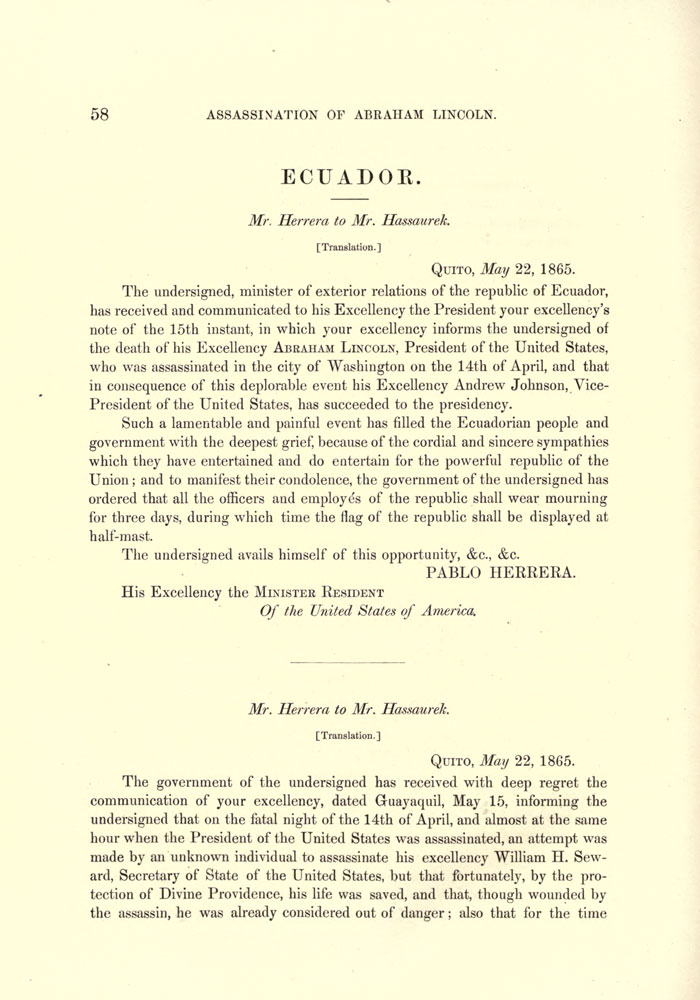
-
Description
Pablo Herrera, foreign minister of Ecuador, expressed his nation’s condolences to the United States on May 22, 1865.
-
Source
-
Rights
This item is in the public domain and may be reproduced and used for any purpose, including research, teaching, private study, publication, broadcast or commercial use, with proper citation and attribution.
-
Creator
Pablo Herrera
-
Date
May 22, 1865
from Apr. 15, 1865
Letter from Lincoln's Cabinet to Andrew Johnson
-
Full Title
Letter from Lincoln's Cabinet to Andrew Johnson
-
Description
Lincoln's Cabinet wrote to Andrew Johnson the day of his assassination to inform him of the events and to inform him of the next move for the U.S. government.
-
Transcription
Washington City DC
April 15, 1865, -
Sir:
Abraham Lincoln, President of the United States, was shot by an assassin last evening, at Ford's Theater in this city and died at the hour of 22 minutes of seven o'clock.
About the same time at which the President was shot, an assassin entered the back chamber of the house of Wm H. Seward, Secretary of State, and stabbed him in several places,
in the throat, neck, and face, severely if not mortally wounding him. Other members of the Secretary's family were dangerously wounded by the assassin while making his escape.
By the death of President Lincoln, the office of President has devolved under the Constitution upon you. The emergency of the government demands that you should immediately qualify, according to the requirements of the Constitution and enter upon the duties of President of the United States. If you will please make known your pleasure, such arrangements as you deem proper will be made.
Your Obedient Servants,
Hugh McCulloch Secretary of the Treasury
Edwin M Stanten Secretary of War
Gideon Welles Secretary of Navy
W. Dennison Postmaster General
J.P. Usher Secretary of the Interior
James Speed Attorney General -
Source
U.S. National Archives, General Records of the Department of State
-
Rights
This item is in the public domain and may be reproduced and used for any purpose, including research, teaching, private study, publication, broadcast or commercial use, with proper citation and attribution.
-
Tags
-
Cite this Item
National Archives. "Letter from Lincoln's Cabinet to Andrew Johnson". General Records of the Department of State. Remembering Lincoln. Web. Accessed May 5, 2025. https://rememberinglincoln.fords.org/node/1198
-
Creator
National Archives
-
Publisher
General Records of the Department of State
-
Date
1865-04-15
from Apr. 15, 1865
Letter from Lincoln's Cabinet to Andrew Johnson
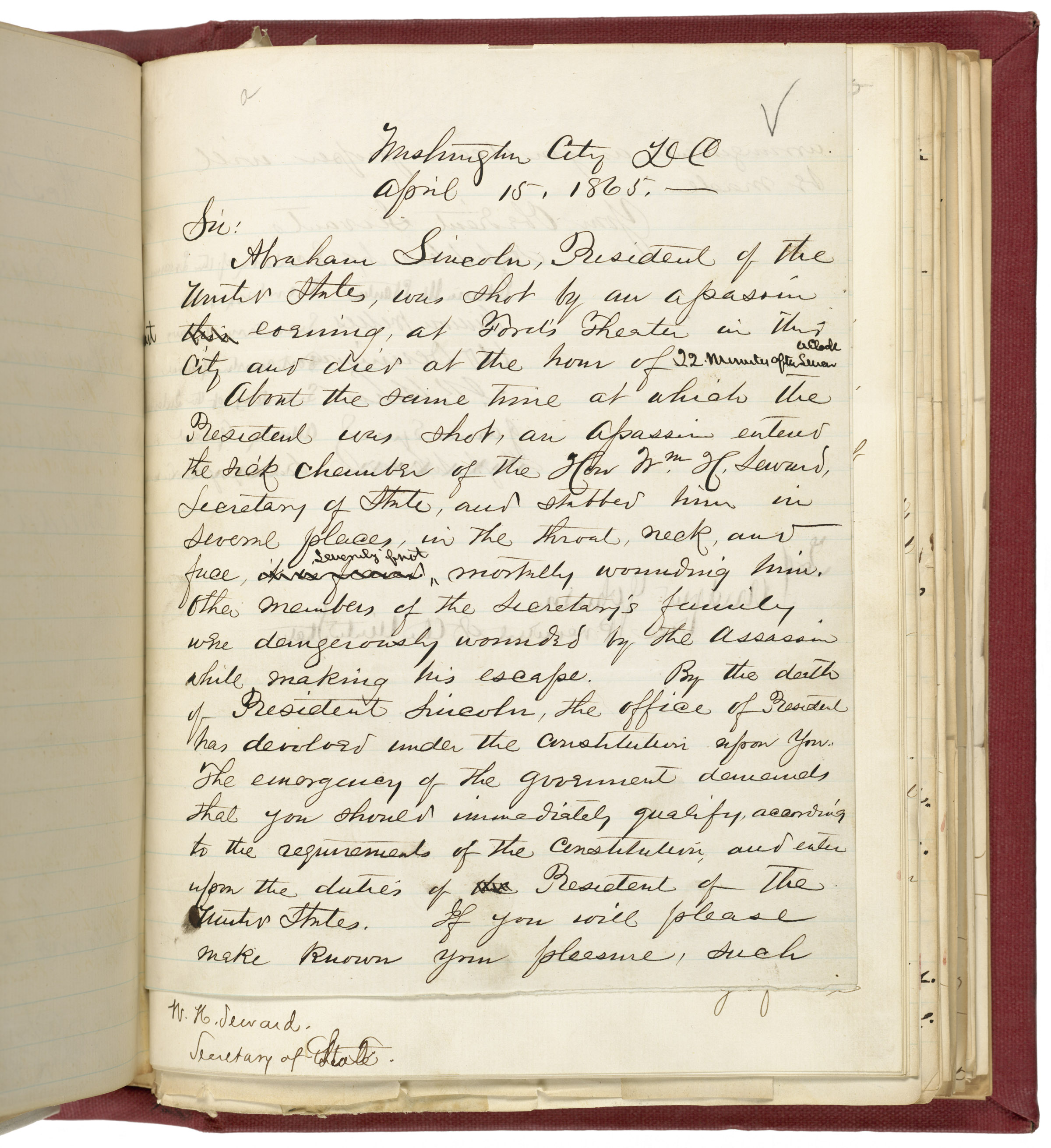
-
Description
Lincoln's Cabinet wrote to Andrew Johnson the day of his assassination to inform him of the events and to inform him of the next move for the U.S. government.
-
Source
U.S. National Archives, General Records of the Department of State
-
Rights
This item is in the public domain and may be reproduced and used for any purpose, including research, teaching, private study, publication, broadcast or commercial use, with proper citation and attribution.
-
Creator
National Archives
-
Publisher
General Records of the Department of State
-
Date
April 15, 1865
from Apr. 18, 1865
President Abraham Lincoln's Washington, DC Funeral Directions and Notes
-
Full Title
President Abraham Lincoln's Washington, DC Funeral Directions and Notes
-
Description
This is a letter and invitation to Matias Romero, the minister of the Mexican Republic, to the funeral of President Abraham Lincoln at the White House. It includes the funeral procession, schedule and list of pallbearers.
-
Transcription
REPUBLIC OF MEXICO. 81
No. 3.
Mr. Hunter to Mr. Romero.
DEPARTMENT OF STATE,
Washington, April 18, 1865.
Sir: I have the honor to enclose a programme of arrangements for the obsequies of the late President. The religious services will take place at the Executive mansion at 12 o'clock to-morrow. Your attendance at half past eleven is invited.
I have the honor to be, with the highest consideration, your obedient servant,
W. HUNTER,
Acting Secretary.
Señor MATIAS ROMERO. &c., Washington, D. C.
_________
[Enclosure No. 1.]
Official arrangements at Washington for the funeral solemnities of the late Abraham Lincoln, President of the United States, who died at the seat of government on Saturday, the 15th day of April, 1865.
WAR DEPARTMENT,
Adjutant General’s Office, Washington, April 17, 1865.
THe following order of arrangements is directed:
ORDER OF THE PROCESSION.
Funeral escort—in column of march.
One regiment of cavalry.
Two batteries of artillery,
Battalion of marines.
Two regiments of infantry.
Commander of escort and staff.
Dismounted officers of marine corps, navy and army, in the order named.
Mounted officers of marine corps, navy army, in the order named.
All military officers to be in uniform, with side-arms.
CIVIC PROCESSION.
Marshal.
Clergy in attendance.
The Surgeon General of the United States army and physicians to to the deceased.
Pall-bearers. HEARSE. Pall-bearers.
Pall-bearers. Pall-bearers.
On the part of the Senate : On the part of the House :
Mr. Foster, of Conecticut, Mr. Dawes, of Massachusetts.
Mr. Morgan, of New York. Mr. Coffroth, of Pennsylvania.
Mr. Johnson, Maryland. Mr. Smith, of Kentucky.
Part ii----6
82 REPUBLIC OF MEXICO.
Mr. Yates of Illinois. Mr. Colfax, of Indiana.
Mr. Wade, of Ohio, Mr. Worthington, of Nevanda.
Mr. Conness, of California. Mr. Washburne, of Illinois.
Army: Navy:
Lieutenant General U. S. Grant Vice-Admiral D. G. Farragut.
Major General H. W. Halleck. Rear-Admiral W. B. Subrick.
Brevet Brigadier General W. A. Nichols. Colonel Jocab Zeilin, marine corps.
Civilians:
O. H. Browning. Thomas Corwin.
George Ashmun. Simon Cameron
Family.
Relatives.
The delegations of the States of Illinois and Kentucky, as mourners.
The President.
The cabinet ministers.
The diplomatic corps.
Ex-Presidents.
The Chief Justice and Associate Justices of the Supreme Court.
The Senate of the United States, preceded by their officers.
Members of the House of Representatives of the United States.
Governors of the several States and Territories.
Legislatures of the several States and Territories.
The federal judiciary and the judiciary of the several States and Territories.
The Assistant Secretaries of State, Treasury, War, Navy, Interior, and the
Assistant Postmaster General, and the Assistant Attorney General.
Officers of the Smithsonian Institution.
The members and officers of the Sanitary and Christian Commissions.
Corporate authorities of Washington, Georgetown, and other cities.
Delegations of the several States.
The reverend the clergy of the various denominations.
The clerks and employés of the several departments and bureaus, preceded by
The heads of such bureaus and their respective chief clerks.
Citizens and strangers.
The troops designated to form the escort will assemble in the avenue, north of the President’s House, and form line precisely at 11 o'clock a. m., on Wednesday, the 19th instant, with the left resting on Fifteenth street. The procession will move precisely at 2 o’clock p. m., on the conclusion of the religious services at the Executive Mansion, (appointed to commence at 12 o’clock, meridian,) when minute-guns will be fired by detachments of artillery stationed near St. John’s Church, the City Hall, and at the Capitol. At the same hour the bells of the several churches in Washington, Georgetown, and Alexandria will be tolled.
At sunrise on Wednesday, the 19th instant, a federal salute will be fired from the military stations in the vicinity of Washington, minute-guns between the house of 12 and 3 o’clock, and a national salute at the setting of the sun.
The usual badge of mourning will be worn on the left arm and on the hilt of the sword.
By order of the secretary of War:
W. A. NICHOLS,
Assistant Adjutant General
[Transcription by: Grace C., Dr. Susan Corbesero’s Class, Ellis School, Pittsburgh, Pennsylvania] -
Source
Google Books
-
Rights
This item is in the public domain and may be reproduced and used for any purpose, including research, teaching, private study, publication, broadcast or commercial use, with proper citation and attribution.
-
Tags
-
Cite this Item
William Hunter. "President Abraham Lincoln's Washington, DC Funeral Directions and Notes ". Government Printing Office. Remembering Lincoln. Web. Accessed May 5, 2025. https://rememberinglincoln.fords.org/node/1126
-
Creator
William Hunter
-
Publisher
Government Printing Office
-
Date
April 18, 1865
from Apr. 18, 1865
President Abraham Lincoln's Washington, DC Funeral Directions and Notes
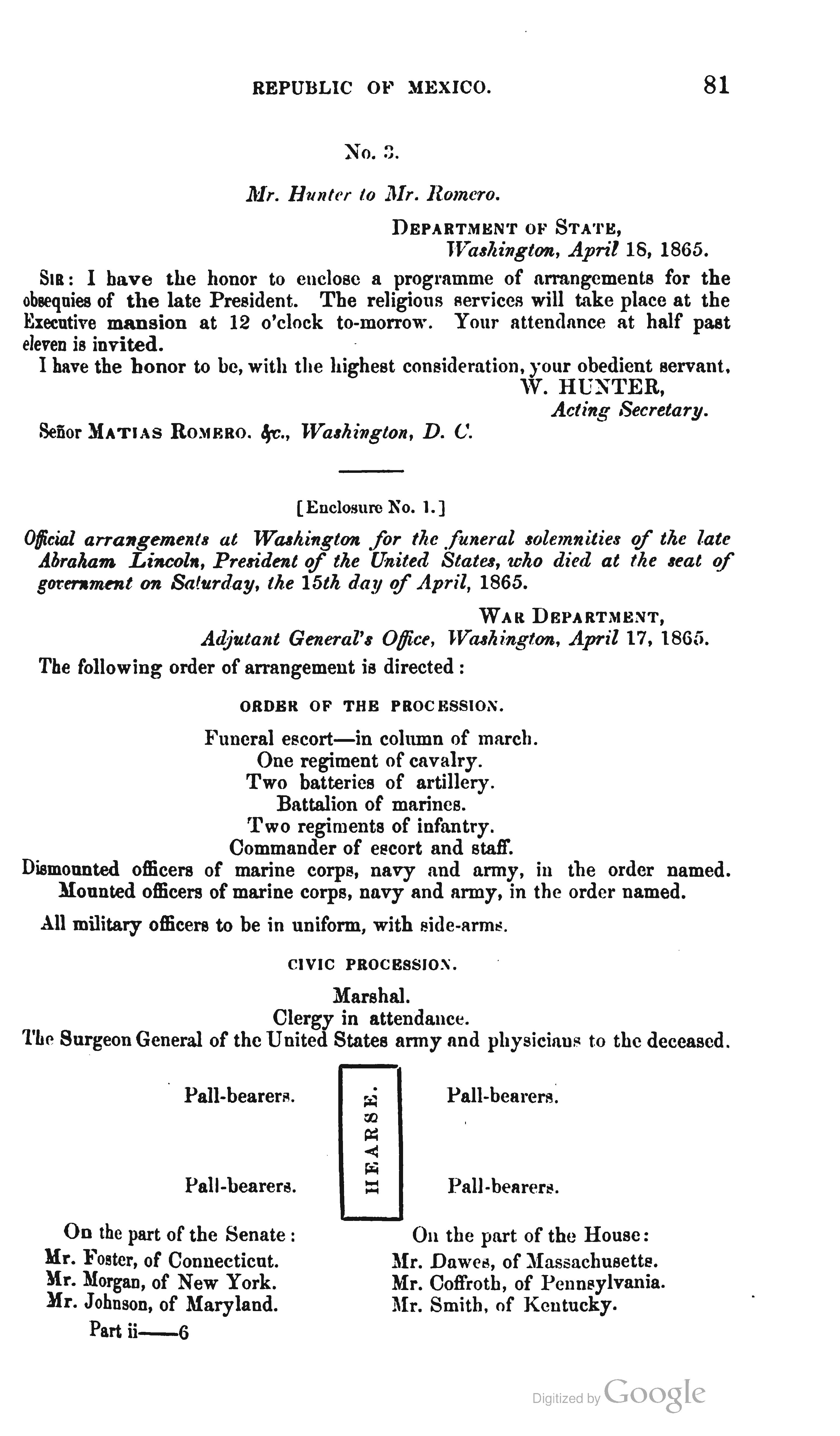
-
Description
This is a letter and invitation to Matias Romero, the minister of the Mexican Republic, to the funeral of President Abraham Lincoln at the White House. It includes the funeral procession, schedule and list of pallbearers.
-
Source
Google Books
-
Rights
This item is in the public domain and may be reproduced and used for any purpose, including research, teaching, private study, publication, broadcast or commercial use, with proper citation and attribution.
-
Creator
William Hunter
-
Publisher
Government Printing Office
-
Date
April 18, 1865
from Jul. 4, 1865
Condolences from the Governor of the State of Tabasco, Mexico
-
Full Title
Condolences from the Governor of the State of Tabasco, Mexico
-
Description
This is a condolence letter from the governor of the State of Tabasco in Southern Mexico. The letter expresses how sad the Mexican government is because of the death of President Lincoln, but they also congratulate the government on winning the American Civil War. The letter discusses the importance of July 4, America's Independence Day, and the country's dedication to freedom and liberty. During the 1860s, Mexico was also in the midst of war. Benito Juarez served as President in Mexico until 1863, when French forces invaded Mexico during the "French Intervention" which began in 1861. The French, backed by conservatives and nobility in Mexico, tried to overthrow Mexican President Benito Juarez. Allies of Juarez fled to New York City, considered a safe haven by Mexican liberals. Juarez set up his government in exile in northern Mexico, in Chihuahua City. This letter tries to solidify the relationship between the exiled government and the American government by reinforcing their shared beliefs and good will.
-
Source
Google Books
-
Rights
This item is in the public domain and may be reproduced and used for any purpose, including research, teaching, private study, publication, broadcast or commercial use, with proper citation and attribution.
-
Tags
-
Cite this Item
G. Mendez. "Condolences from the Governor of the State of Tabasco, Mexico ". Government Printing Office. Remembering Lincoln. Web. Accessed May 5, 2025. https://rememberinglincoln.fords.org/node/1125
-
Creator
G. Mendez
-
Publisher
Government Printing Office
-
Date
July 4, 1865
from Jul. 4, 1865
Condolences from the Governor of the State of Tabasco, Mexico
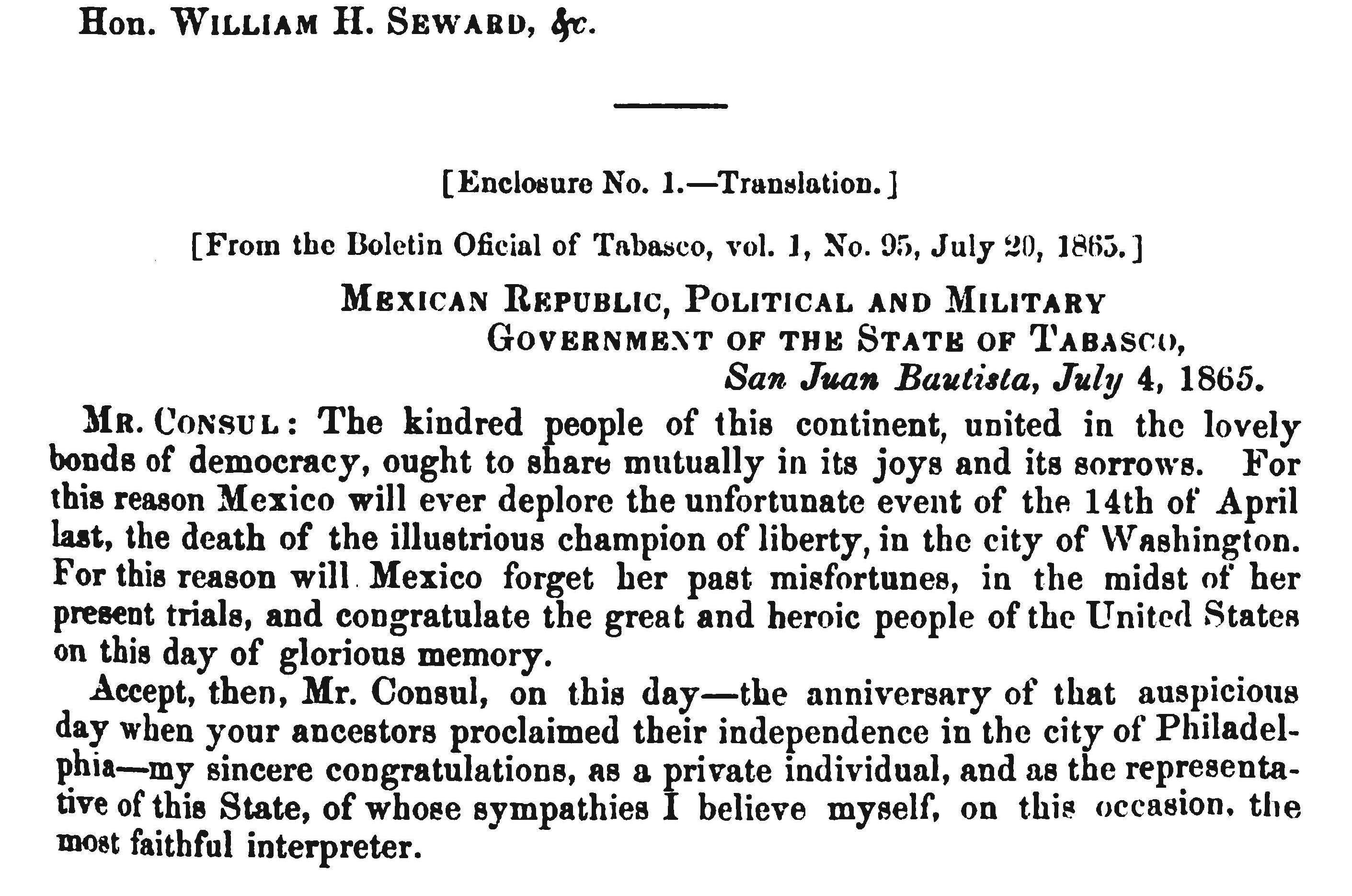
-
Description
This is a condolence letter from the governor of the State of Tabasco in Southern Mexico. The letter expresses how sad the Mexican government is because of the death of President Lincoln, but they also congratulate the government on winning the American Civil War. The letter discusses the importance of July 4, America's Independence Day, and the country's dedication to freedom and liberty. During the 1860s, Mexico was also in the midst of war. Benito Juarez served as President in Mexico until 1863, when French forces invaded Mexico during the "French Intervention" which began in 1861. The French, backed by conservatives and nobility in Mexico, tried to overthrow Mexican President Benito Juarez. Allies of Juarez fled to New York City, considered a safe haven by Mexican liberals. Juarez set up his government in exile in northern Mexico, in Chihuahua City. This letter tries to solidify the relationship between the exiled government and the American government by reinforcing their shared beliefs and good will.
-
Source
Google Books
-
Rights
This item is in the public domain and may be reproduced and used for any purpose, including research, teaching, private study, publication, broadcast or commercial use, with proper citation and attribution.
-
Creator
G. Mendez
-
Publisher
Government Printing Office
-
Date
July 4, 1865
from May. 16, 1865
Department of Foreign Relations and Government - Mexican Response to Lincoln Assassination
-
Full Title
Department of Foreign Relations and Government - Mexican Response to Lincoln Assassination
-
Description
In this official letter from the exiled Mexican government, Sebastián Lerdo de Tejada, the minister of foreign affairs, notifies the United States of their remorse for the death of President Abraham Lincoln. The letter says the Mexican government will fly flags at half mast and wear mourning attire for nine days to honor Abraham Lincoln. Lerdo de Tejada served as second in command to exiled Mexican President Benito Juarez during the "French Intervention" which began in 1861. The French, backed by conservatives and nobility in Mexico, tried to overthrow Mexican President Benito Juarez. Juarez set up his government in exile in northern Mexico, in Chihuahua City, and eventually won the war in 1867.
-
Transcription
Hon. William H. Seward, &c.
_____
[Enclosure No. 1. – Translation.]
[Official.]
DEPARTMENT OF FOREIGN RELATIONS AND GOVERNMENT—DEPARTMENT OF GOVERNMENT, FIRST BUREAU.
[Circular.]
The official confirmation has been received that the President of the United States of America, Abraham Lincoln, died at Washington, at seven o’clock and twenty-two minutes, on the morning of the 15th day of April last, in consequence of the wound inflicted upon him by an assassin at half past nine o’clock on the previous night. The deplorable end of President Lincoln is a cause of great regret to the government of the Mexican republic, and to all its good citizens, by reason of his eminent personal qualities and because, during his administration, the government of the United States has continued in the most friendly relations with that of the Mexican republic in the difficult state of affairs thereof.
With the view that the manifestations of the public sorrow for that end event may be adopted, the citizen President directs that the national flag be hoisted at half-mast upon all the public buildings and at all the military stations during the day subsequent to the reception of this circular, and that all the authorities, functionaries, and employés, both civil and military, clothe themselves in mourning during nine days.
Independence and liberty! Chihuahua, May 16, 1865.
LERDO DE TEJADA
The Citizen Governor of the State of ——— .
[Transcription by: Ricarda H., Dr. Susan Corbesero’s Class, Ellis School, Pittsburgh, Pennsylvania] -
Source
Google Books
-
Rights
This item is in the public domain and may be reproduced and used for any purpose, including research, teaching, private study, publication, broadcast or commercial use, with proper citation and attribution.
-
Tags
-
Cite this Item
Sebastián Lerdo de Tejada. "Department of Foreign Relations and Government - Mexican Response to Lincoln Assassination". Government Printing Office. Remembering Lincoln. Web. Accessed May 5, 2025. https://rememberinglincoln.fords.org/node/1124
-
Creator
Sebastián Lerdo de Tejada
-
Publisher
Government Printing Office
-
Date
May 16, 1865
from May. 16, 1865
Department of Foreign Relations and Government - Mexican Response to Lincoln Assassination
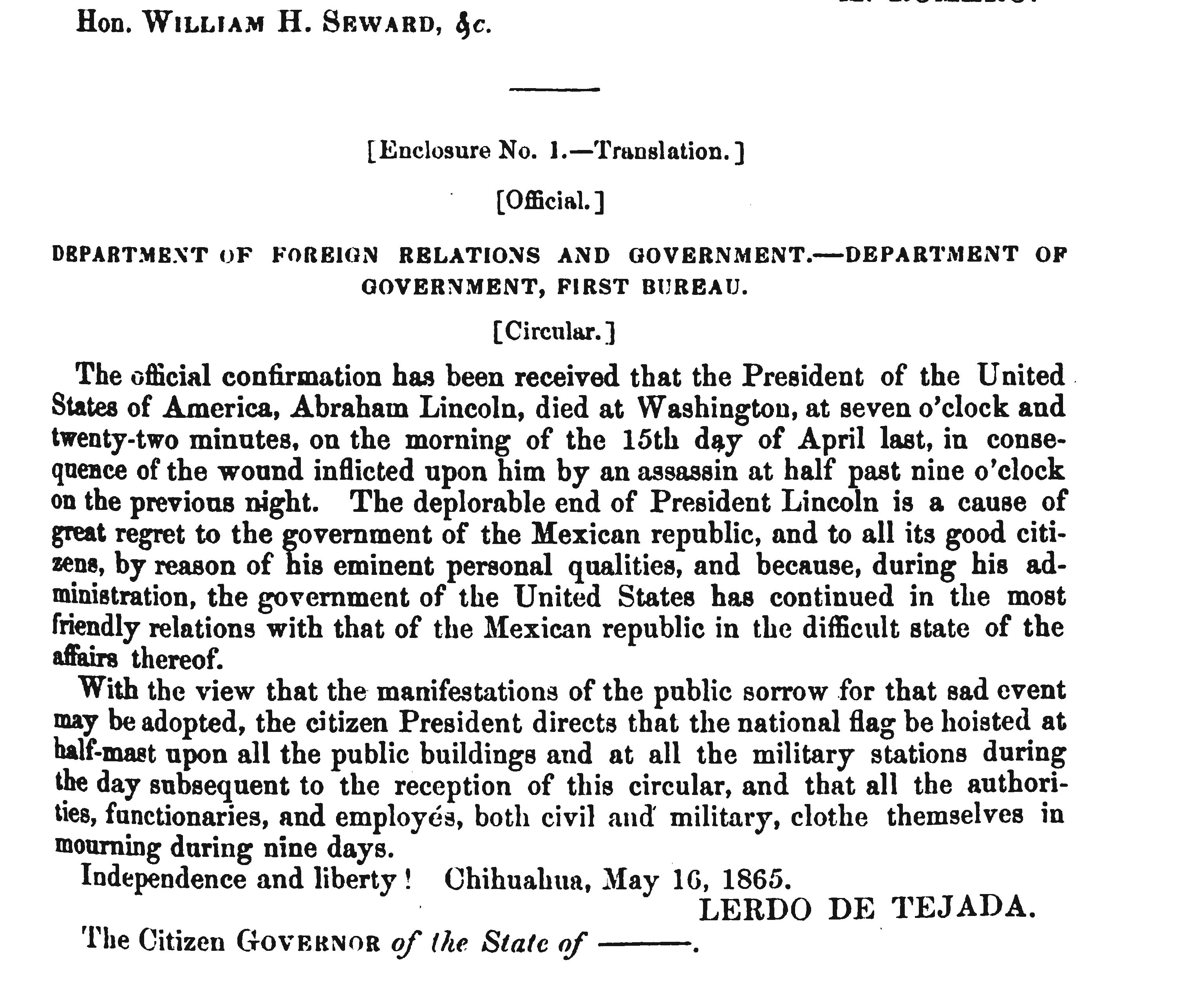
-
Description
In this official letter from the exiled Mexican government, Sebastián Lerdo de Tejada, the minister of foreign affairs, notifies the United States of their remorse for the death of President Abraham Lincoln. The letter says the Mexican government will fly flags at half mast and wear mourning attire for nine days to honor Abraham Lincoln. Lerdo de Tejada served as second in command to exiled Mexican President Benito Juarez during the "French Intervention" which began in 1861. The French, backed by conservatives and nobility in Mexico, tried to overthrow Mexican President Benito Juarez. Juarez set up his government in exile in northern Mexico, in Chihuahua City, and eventually won the war in 1867.
-
Source
Google Books
-
Rights
This item is in the public domain and may be reproduced and used for any purpose, including research, teaching, private study, publication, broadcast or commercial use, with proper citation and attribution.
-
Creator
Sebastián Lerdo de Tejada
-
Publisher
Government Printing Office
-
Date
May 16, 1865
from May. 11, 1865
Mexican President Benito Juarez Response to the Lincoln Assassination
-
Full Title
Mexican President Benito Juarez Response to the Lincoln Assassination
-
Description
This is a condolence letter from the exiled Mexican President Benito Juarez. In the letter Juarez mourns the loss of Abraham Lincoln and also hopes that the U.S. Secretary of State and his son recover from their wounds. On the night of President's assassination, U.S. Secretary of State William Seward was also attacked. He was stabbed repeatedly in his home by conspirator Lewis Powell. Eventually Seward recovered from his wounds. Benito Juarez served as President in Mexico until 1863, when French forces invaded Mexico during the "French Intervention" which began in 1861. The French, backed by conservatives and nobility in Mexico, tried to overthrow Mexican President Benito Juarez. Allies of Juarez fled to New York City, considered a safe haven by Mexican liberals. Juarez set up his government in exile in northern Mexico, in Chihuahua City.
-
Transcription
Hon. William H. Seward, &c.
_____
[Enclosure No. 1. – Translation.]
Chihuahua, May 11, 1865.
My Dear Friend …
We also received the day before yesterday the news of the total defeat of the confederate army on the 9th of April. The great pleasure this news afforded us was marred by the very sad impression which the shocking intelligence of President Lincoln’s assassination produced upon us. That great misfortune has profoundly impressed me, as Mr. Lincoln, who worked with so much earnestness and abnegation for the cause of nationality and freedom was worthy of a better fate than the poniard of a coward assassin. I do most earnestly hope that Mr. Seward’s wounds would not be mortal, and that his son too, may have been saved. I beg of you to pay a private visit to Mr. Seward in my name, expressing to him my grief for the misfortunes befallen upon him, and my best wishes for his speedy and complete recovery.
Benito Juarez
Senor Don Matias Rombro
[Transcription by: Ricarda H., Dr. Susan Corbesero’s Class, Ellis School, Pittsburgh, Pennsylvania]
-
Source
Google Books
-
Rights
This item is in the public domain and may be reproduced and used for any purpose, including research, teaching, private study, publication, broadcast or commercial use, with proper citation and attribution.
-
Tags
-
Cite this Item
Benito Juarez. "Mexican President Benito Juarez Response to the Lincoln Assassination". Government Printing Office. Remembering Lincoln. Web. Accessed May 5, 2025. https://rememberinglincoln.fords.org/node/1123
-
Creator
Benito Juarez
-
Publisher
Government Printing Office
-
Date
May 11, 1865
from May. 11, 1865
Mexican President Benito Juarez Response to the Lincoln Assassination
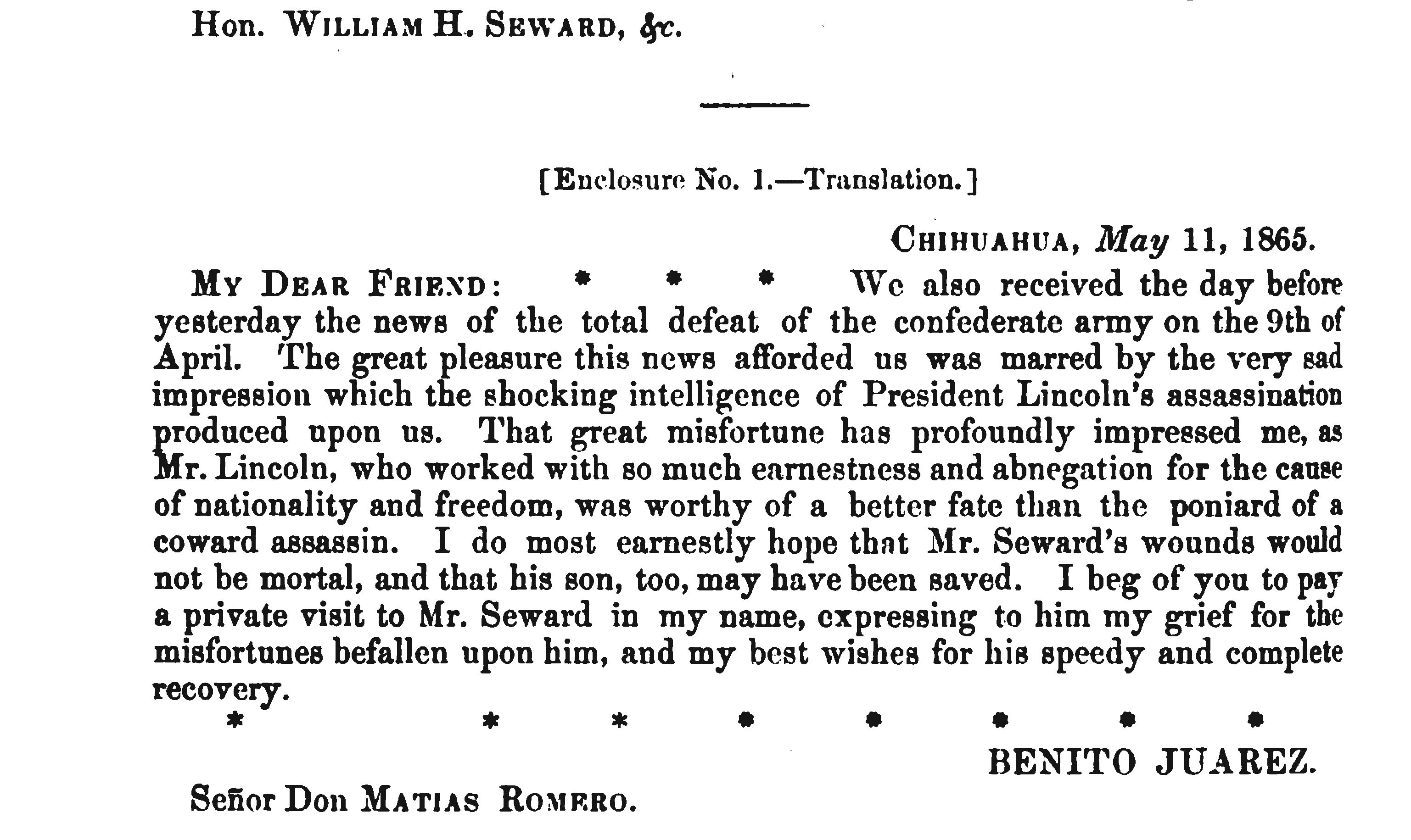
-
Description
This is a condolence letter from the exiled Mexican President Benito Juarez. In the letter Juarez mourns the loss of Abraham Lincoln and also hopes that the U.S. Secretary of State and his son recover from their wounds. On the night of President's assassination, U.S. Secretary of State William Seward was also attacked. He was stabbed repeatedly in his home by conspirator Lewis Powell. Eventually Seward recovered from his wounds. Benito Juarez served as President in Mexico until 1863, when French forces invaded Mexico during the "French Intervention" which began in 1861. The French, backed by conservatives and nobility in Mexico, tried to overthrow Mexican President Benito Juarez. Allies of Juarez fled to New York City, considered a safe haven by Mexican liberals. Juarez set up his government in exile in northern Mexico, in Chihuahua City.
-
Source
Google Books
-
Rights
This item is in the public domain and may be reproduced and used for any purpose, including research, teaching, private study, publication, broadcast or commercial use, with proper citation and attribution.
-
Creator
Benito Juarez
-
Publisher
Government Printing Office
-
Date
May 11, 1865
from Apr. 15, 1865
Condolences from the Mexican Club of New York
-
Full Title
Condolences from the Mexican Club of New York to Secretary of State William Seward
-
Description
This is a condolence letter from the Vice President of the Mexican Club of New York to the U.S. Secretary of State William Seward after news of Abraham Lincoln's assassination reached New York. The letter talks about how important President Lincoln was to the ideals of liberty and freedom in the United States and reaffirms Mexico's commitment to their friendship with the country. The Mexican Club of New York was created in 1864, as exiles from the Mexican government fled Mexico during the French Intervention, which began in 1861. The French, backed by conservatives and nobility in Mexico tried to overthrow Mexican President Benito Juarez. Allies of Juarez fled to New York City, considered a safe haven by Mexican liberals. U.S. Secretary of State William Seward quietly supported the work of the Club but refused to promise too more nor interfere with the war in Mexico. The Club's president, Benito Quijano, had died in early 1865 and at the time of Abraham Lincoln's death a new successor had not been chosen.
-
Transcription
Republic of Mexico
[Enclosure No. 2 – Translation.]
Mexican Club at New York.
New York, April 15, 1865.
Sir: The Mexican Club of New York, profoundly affected by the tragic and premature death of the President of the United States, Abraham Lincoln, has resolved to manifest to your excellency that the citizens which compose it fully sympathize the affliction of the American people; that they look upon the loss of this eminent patriot not only as a great calamity to the United States, but as a just cause of mourning for all the peoples who in America enjoy liberty, or are contending to restore it; and they believe that with Lincoln there has disappeared from earth one of the great benefactors of humanity, who, on descending to the tomb, has been crowned with the laurel of immortality and martyrdom.
To the veneration which Lincoln will have in history, as the personification of the great American people, in his firmness, in his energy, in his enlightenment, and in his magnanimity, to his great title of the emancipator of the slaves, he will always add in the hearts of the Mexicans the acknowledgement which the love of justice and the respect for law inspires, of which he gave proofs, in not sanctioning the outrages committed against Mexico, and in not acknowledging in that republic any other power than that which is derived from the institutions and the free national will.
The Mexican Club, in taking part in the affliction of the people of the United States, upon whom it looks as a nation of brothers, cherishes the hope that as the spirit of Washington has animated this nation in the work of consolidating its institutions, so the spirit of Lincoln may continue to guide it until peace and union are restored, slavery abolished, and until it shall become the bulwark of liberty for all America.
On addressing this manifestation to your excellency, we have the honor to offer to you the assurances of our very distinguished consideration.
In absence of the president, from indisposition,
IGNACIO MEJIA, Vice President.
CIPRIANO ROBERT, Secretary.
Hon. Secretary of State of the United States.
[Transcription by: Ricarda H., Dr. Susan Corbesero’s Class, Ellis School, Pittsburgh, Pennsylvania] -
Source
Google Books
-
Rights
This item is in the public domain and may be reproduced and used for any purpose, including research, teaching, private study, publication, broadcast or commercial use, with proper citation and attribution.
-
Tags
-
Cite this Item
Ignacio Mejia. "Condolences from the Mexican Club of New York to Secretary of State William Seward". Government Printing Office. Remembering Lincoln. Web. Accessed May 5, 2025. https://rememberinglincoln.fords.org/node/1122
-
Creator
Ignacio Mejia
-
Publisher
Government Printing Office
-
Date
April 15, 1865
from Apr. 15, 1865
Condolences from the Mexican Club of New York to Secretary of State William Seward
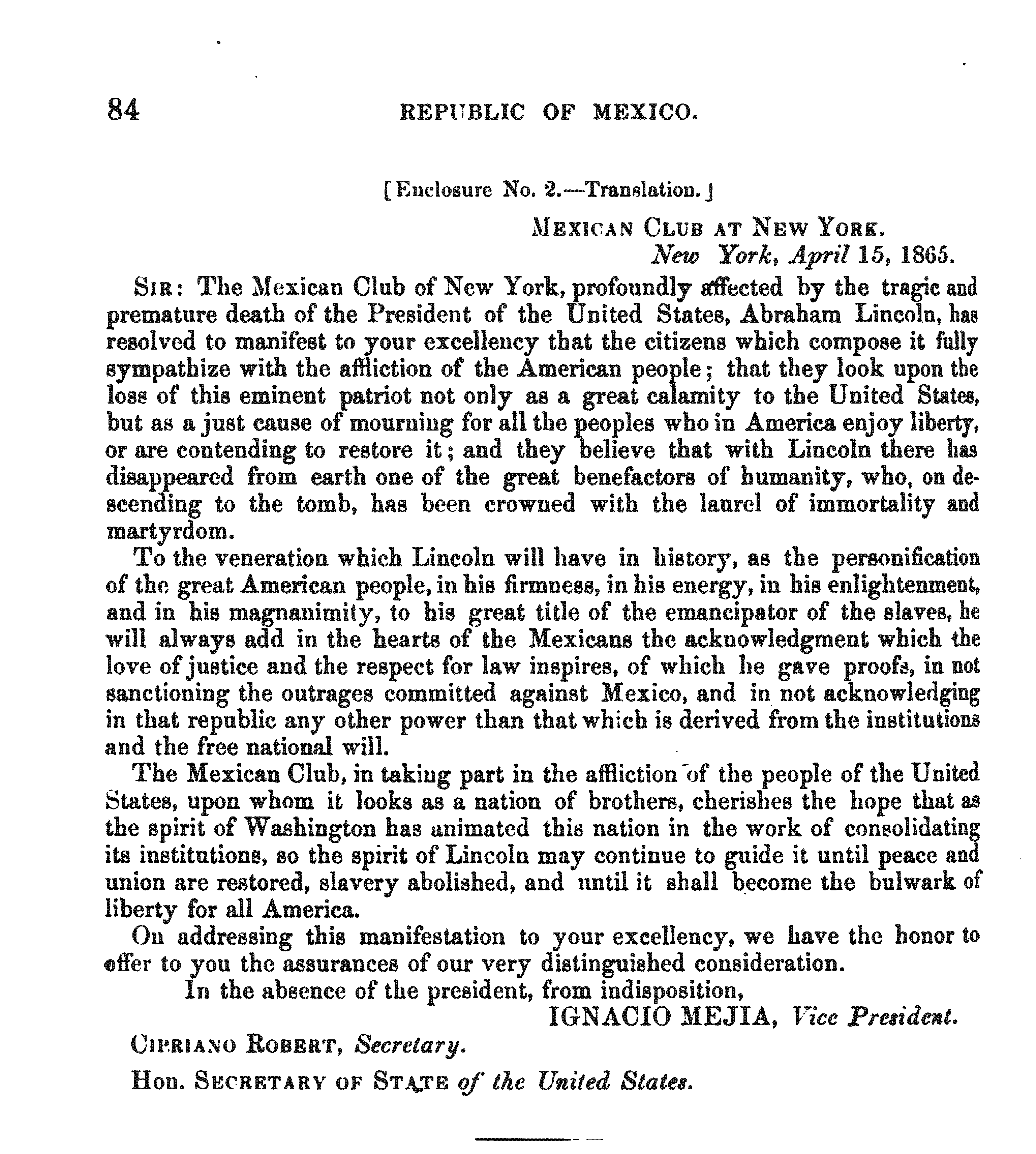
-
Description
This is a condolence letter from the Vice President of the Mexican Club of New York to the U.S. Secretary of State William Seward after news of Abraham Lincoln's assassination reached New York. The letter talks about how important President Lincoln was to the ideals of liberty and freedom in the United States and reaffirms Mexico's commitment to their friendship with the country. The Mexican Club of New York was created in 1864, as exiles from the Mexican government fled Mexico during the French Intervention, which began in 1861. The French, backed by conservatives and nobility in Mexico tried to overthrow Mexican President Benito Juarez. Allies of Juarez fled to New York City, considered a safe haven by Mexican liberals. U.S. Secretary of State William Seward quietly supported the work of the Club but refused to promise too more nor interfere with the war in Mexico. The Club's president, Benito Quijano, had died in early 1865 and at the time of Abraham Lincoln's death a new successor had not been chosen.
-
Source
Google Books
-
Rights
This item is in the public domain and may be reproduced and used for any purpose, including research, teaching, private study, publication, broadcast or commercial use, with proper citation and attribution.
-
Creator
Ignacio Mejia
-
Publisher
Government Printing Office
-
Date
April 15, 1865
from May. 1, 1865
Letter to Mary Todd Lincoln from Queen Victoria
-
Full Title
Letter to Mary Todd Lincoln from Queen Victoria
-
Description
Manuscript transcription of a letter from Queen Victoria to Mrs. Abraham Lincoln, written in purple ink on white woven paper. Queen Victoria, the British monarch, wrote to Mary Lincoln after learning about the assassination of Abraham Lincoln. The two women had never met, but Queen Victoria wanted to convey her sympathies to Mrs. Lincoln because she also lost her husband in 1861 and went into intense mourning.
-
Transcription
Copy of a letter from Queen Victoria to Mrs. President Lincoln Osborne, April. 1865
Thought a stranger to you, cannot remain silent w[?] so terrible a calamity has fallen upon you and your country; and must personally express my deep and heartfelt sympathy wi[?] you under shocking circumstances of your present— dreadful misfortune. No one can better appreciate, than I can, who am myself utterly broken hearted by the loss of my own beloved husband, who was the light of my life, my stay, my all, —what your own sufferings must be, and I earnestly pray that you may be supported by Him, to whom alone the sorely stricken can look for comfort in their hour of heavy afflication.
With the renewed expression of true sympathy, I remain, dear Madam, Your sincere friend, Victoria -
Source
Library of Congress
-
Rights
This item is in the public domain and may be reproduced and used for any purpose, including research, teaching, private study, publication, broadcast or commercial use, with proper citation and attribution.
-
Tags
-
Cite this Item
Queen Victoria. "Letter to Mary Todd Lincoln from Queen Victoria". Remembering Lincoln. Web. Accessed May 5, 2025. https://rememberinglincoln.fords.org/node/1108
-
Creator
Queen Victoria
-
Date
1865
-
Dimensions
21 x 11 cm
from May. 1, 1865
Letter to Mary Todd Lincoln from Queen Victoria
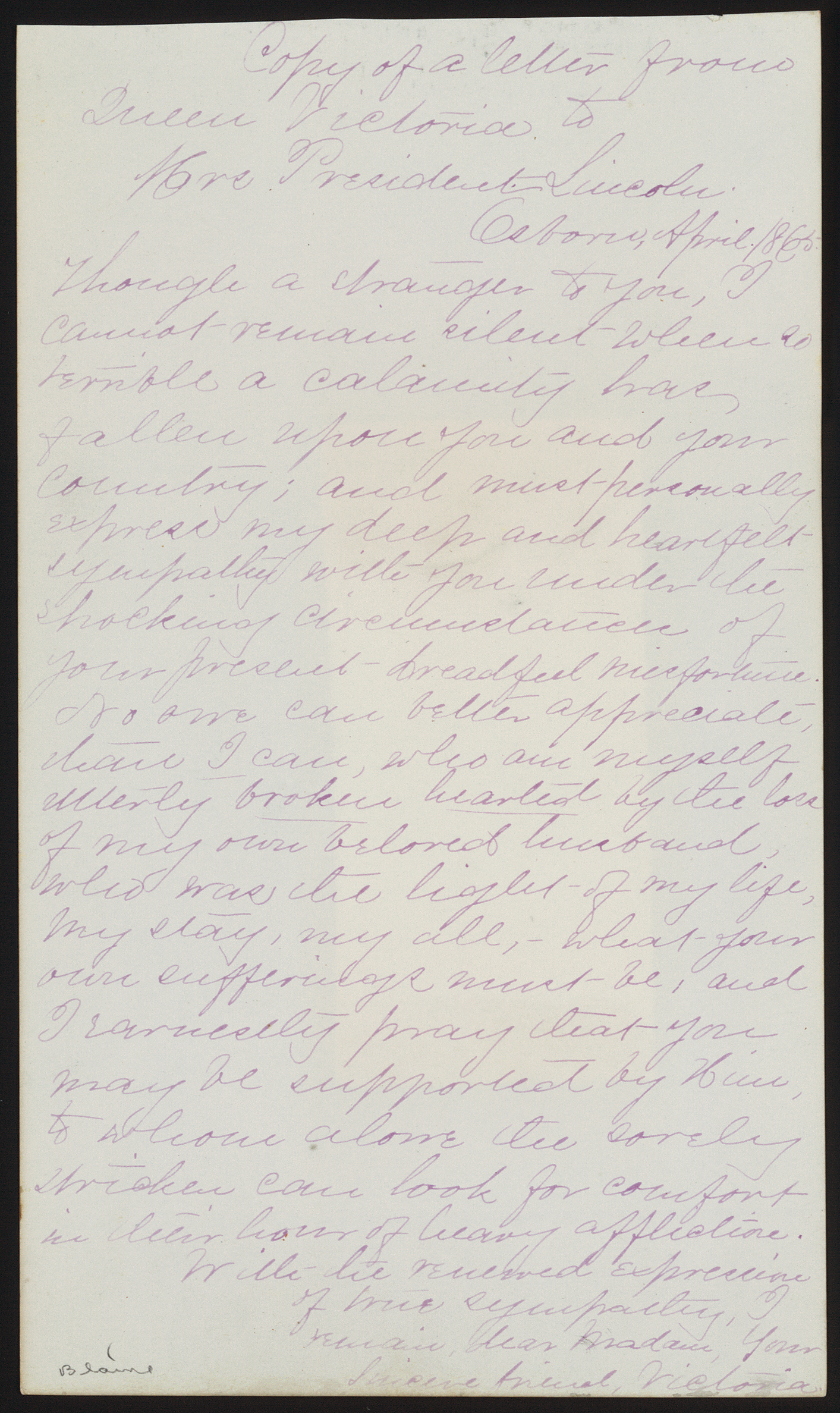
-
Description
Manuscript transcription of a letter from Queen Victoria to Mrs. Abraham Lincoln, written in purple ink on white woven paper. Queen Victoria, the British monarch, wrote to Mary Lincoln after learning about the assassination of Abraham Lincoln. The two women had never met, but Queen Victoria wanted to convey her sympathies to Mrs. Lincoln because she also lost her husband in 1861 and went into intense mourning.
-
Source
Library of Congress
-
Rights
This item is in the public domain and may be reproduced and used for any purpose, including research, teaching, private study, publication, broadcast or commercial use, with proper citation and attribution.
-
Creator
Queen Victoria
-
Date
May 1, 1865
-
Dimensions
21 x 11 cm
from Apr. 14, 1865
Horatio Nelson Taft Diary, April 6-14, 1865
-
Full Title
Horatio Nelson Taft Diary, April 6-14, 1865
-
Description
This excerpt from the diary of Horatio Nelson Taft is an insight into some of the first reactions of citizens of the Union to the death of President Lincoln. Taft, who was a patent clerk, laments Lincoln's teach and denounces the assassination as assassination at it's worst. In the entry just prior to the excerpt describing Lincoln's death, Taft described the return of Lincoln to Washington after a Union victory.
-
Transcription
April 6th 1865
Mr Lincoln has been in Richmond. Near half of the City has been destroyed by fire by the
Rebels themselves as they evacuated it. Large numbers of prisoners have been captured
by Sheridan, Genl Ewell and his Corps, some seven thousand.
April 9, 1865
Genl Lee has surrendered to Genl Grant with his whole Army!! Mr Lincoln has returned to
Washington as in fine Spirits at the prospect of a speedy peace. It is thought that Johnson
and the other rebel Genls will give up now that Lee has surrendered.
April 14th ½ past 10 o'clock P.M.
O, fatal day. O, noble Victim.
Treason has done its worst.
The President has been Assassinated.
It has just been announced at my door
that he was shot a half hour ago at Fords Theatre.
Is it possible?
I have just come from near the scene,
it is too True. 11, o'clock P.M. -
Source
memory.loc.gov
-
Rights
This item is in the public domain and may be reproduced and used for any purpose, including research, teaching, private study, publication, broadcast or commercial use, with proper citation and attribution.
-
Tags
-
Cite this Item
Horatio Nelson Taft. "Horatio Nelson Taft Diary, April 6-14, 1865". Remembering Lincoln. Web. Accessed May 5, 2025. https://rememberinglincoln.fords.org/node/1107
from Apr. 14, 1865
Horatio Nelson Taft Diary, April 6-14, 1865

-
Description
This excerpt from the diary of Horatio Nelson Taft is an insight into some of the first reactions of citizens of the Union to the death of President Lincoln. Taft, who was a patent clerk, laments Lincoln's teach and denounces the assassination as assassination at it's worst. In the entry just prior to the excerpt describing Lincoln's death, Taft described the return of Lincoln to Washington after a Union victory.
-
Source
memory.loc.gov
-
Rights
This item is in the public domain and may be reproduced and used for any purpose, including research, teaching, private study, publication, broadcast or commercial use, with proper citation and attribution.
-
Creator
Horatio Nelson Taft
-
Date
April 14, 1865
-
Material
bound paper with script in ink and type
from Jul. 1, 1865
Phoebe Cary Poem on Lincoln's Death
-
Full Title
Phoebe Cary Poem on Lincoln's Death
-
Description
Philadelphia publishing house J.B. Lippincott & Co. compiled poetical tributes to President Lincoln in the months after his assassination. This piece, by Phoebe Cary, talks about how the mood of the country has changed from happiness for the end of the war to sadness for Lincoln's death. She goes on to describe his mercy and considerate leadership. Phoebe Cary was a well known poet and suffragette from Ohio. Later in life she moved to New York with her sister, Alice Cary, who was also a poet. During her lifetime she published two volumes of her own work.
-
Source
University of Wisconsin - Madison, Digitized by Google
-
Rights
This item is in the public domain and may be reproduced and used for any purpose, including research, teaching, private study, publication, broadcast or commercial use, with proper citation and attribution.
-
Tags
-
Cite this Item
Pheobe Cary. "Phoebe Cary Poem on Lincoln's Death". J.B. Lippincott & Co.. Remembering Lincoln. Web. Accessed May 5, 2025. https://rememberinglincoln.fords.org/node/1102
-
Creator
Pheobe Cary
-
Publisher
J.B. Lippincott & Co.
-
Date
1865
from Jul. 1, 1865
Phoebe Cary Poem on Lincoln's Death
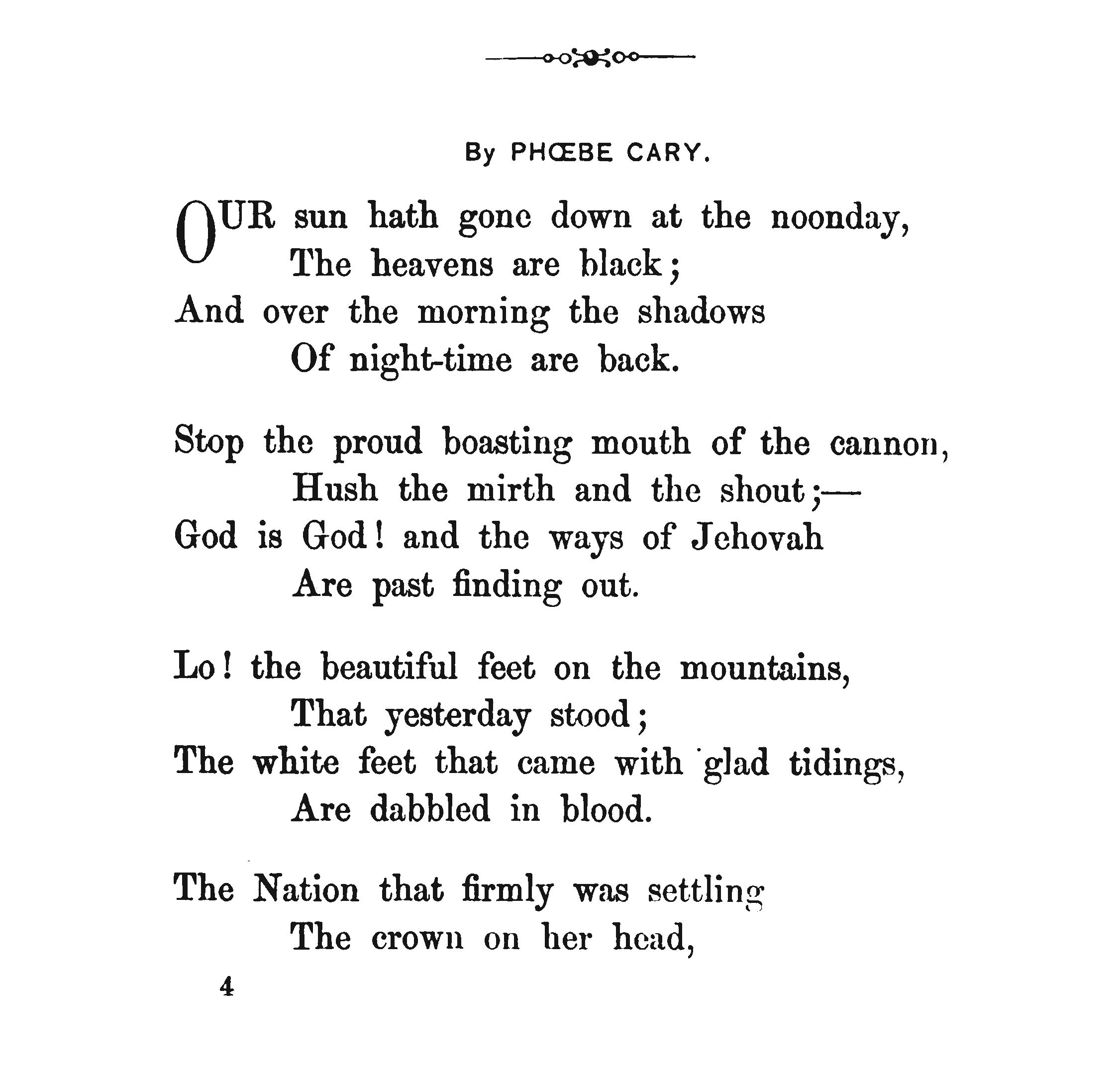
-
Description
Philadelphia publishing house J.B. Lippincott & Co. compiled poetical tributes to President Lincoln in the months after his assassination. This piece, by Phoebe Cary, talks about how the mood of the country has changed from happiness for the end of the war to sadness for Lincoln's death. She goes on to describe his mercy and considerate leadership. Phoebe Cary was a well known poet and suffragette from Ohio. Later in life she moved to New York with her sister, Alice Cary, who was also a poet. During her lifetime she published two volumes of her own work.
-
Source
University of Wisconsin - Madison, Digitized by Google
-
Rights
This item is in the public domain and may be reproduced and used for any purpose, including research, teaching, private study, publication, broadcast or commercial use, with proper citation and attribution.
-
Creator
Pheobe Cary
-
Publisher
J.B. Lippincott & Co.
-
Date
July 1, 1865
